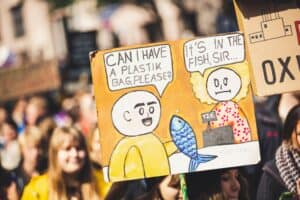Help staff and customers increase their environmental literacy and exponentially impact your target sustainability goals
The SEAL Awards are given out every year to the most sustainable companies in the world. Determining winners depends on their “measurable contribution” to making a positive impact on environmental issues. Honing measurable contributions for sustainable brands goes beyond “pat yourself on the back” talk, it’s all about calculating the true impact of sustainability initiatives. For example, it’s great to say you reduce plastic waste, but making a measurable contribution means you actually achieved a calculated goal without replacing one bad material for another. Measurable contributions are of great importance for assessing genuine environmental impact and the overall goal to push for better solutions. One thing that can drive those measurable results is educating your customer and employee base. Gone are the days of greenwashing, as we say hello to merit and walking the walk when it comes to sustainability initiatives and measurable outcomes.
Your customers care about your sustainability initiatives so you have to make sure that yours are genuine. Let’s start with some facts, according to Forbes:





How conducting environmental education increases your brand’s impact

Studies show that environmental education leads to many positive outcomes, including enhanced critical thinking, the development of life-building and problem-solving skills, community engagement, civic engagement, and leadership. We are bringing people together for pragmatic solutions to the climate crisis and other environmental issues. And while most of these studies look at students, our entire world is on an environmental learning curve. The global community will greatly benefit from the same unbiased, transparent environmental education. Having a working knowledge of environmental issues helps us step up to the plate; employees and customers make more informed decisions. When we arm our communities with the knowledge they need, in a friendly, helpful, empathetic way, we can start making real changes and grow a much-needed sustainability revolution.
We have found there are three key benefits of using education in marketing efforts both on the ground and digitally for environmentally-driven companies and organizations. They are simple, and they are human-centric.
3 Benefits of adding education to sustainable brand marketing
- Education creates a deeper understanding of the environmental issues we are solving

We have taken a leadership role in educating about environmental issues and raising the level of environmental literacy for the communities of the brands we work with. We come to people where they’re at, at their level of understanding, and share how brands with environmental innovations are solving some of the adverse effects on our health, on the planet, the ocean, and wildlife. This creates a deeper understanding of the huge issue we are working to solve but can’t do alone.
- Connect your community to solutions for environmental issues your brand is working to solve
Going one step further, we’ve seen that using education in a funnel style not only gets students and adults to understand environmental problems but also helps them to connect where they fit into the picture of solving the issues within their control. For us, that usually means helping people learn about, adopt shifts, and demand policies that support solutions like solar energy, a reusable bottle, sustainable laundry products. Helping others means teaching them to see their place in the shift; adopting better habits and demanding policies that squash the environmentally damaging alternatives like fossil fuels, plastics, harmful chemicals, etc.
Connecting people, for example, to the issue of plastic waste in a sensitive non-blaming way helps people feel like they can easily do some things within their power to be a part of the change. Educating through our marketing communications helps people know where they fit into the bigger picture as well as how and when they can take action.
- Creates actionable opportunities for our community to get involved
When we lead a movement, we have to guarantee an end result, real change. I have found that just as soon as we take on an educational campaign, individuals, businesses, and non-profit organizations are ready to sign on for the solution and engage politically. We used to wonder how much people care about the damaged environment that directly affected their health, and whether or not people were even concerned about climate change or plastic waste. Maybe people were overwhelmed, couldn’t see a solution, or felt that they did not have enough influence to change the problem. But we’ve learned that when you present someone with an easy-to-replace solution to things like plastic waste, it’s one small, actionable step that most people are ready to take. Then you can introduce them to petitions and political solutions, now that they feel empowered and connected to the solution they just committed to.
These three benefits are the result of the strategies we use to help brands make a more significant impact. Educating, creating, and connecting are exponential efforts that work together to fuel great change. The more environmental education we conduct in the world, the more people sign on for our efforts and political change, they then share their enthusiasm and education with others and it becomes easier to see how we can create a cleaner planet. When we do justice to the educational efforts, we help the movement grow exponentially with every new person indoctrinated into the solution. Taking on a component of education for marketing requires honesty, planning, and above all, it takes leadership.
Leadership: what are the best practices for brands that want to lead on genuine sustainability?
We’ve learned a handful of best practices both for educating on sustainable solutions in various industries.
While there are many new eco-alternatives on the market, they span across a spectrum of dismal greenwashing to genuine solutions. From this perspective, we’ve learned that people deserve transparency to make the best choices. The more you educate about your process, purpose, and how it stacks up to the other options, the deeper you can connect with more people on the issues that matter, and on solutions. While some people are okay with a sustainable tagline and pat on the back, more often than not, people want to make an actual impact on the problem.
The same can be understood for any sustainable product. If we had to list the best practices, they would include but not be limited to the following:
- Be impeccable with your sustainable solution.
- Be transparent with your process.
- Offer education to elevate the baseline knowledge on the environmental issue you’re solving, and make this a constant team effort.
- Create a community of game-changers to build momentum.
- Collaborate on policies on the local, state, and global levels that solve the problem your initiative addresses.
Our team shares sustainable best practices through our website, environmental educational courses, via our environmental content, social media engagement, and public relations teams.
Awards are wonderful milestones, educating a community to take action for a greater impact is even better
While recognition like the SEAL awards is a great way to mark milestones for sustainable missions, some of the most significant rewards are the communities we build and the actual impact we make. It’s our goal to see measurable environmental impacts increase every year. We don’t have time to wait. In our teams’ experience with educational campaigns, a tremendous way to increase that measurable impact directly relates to education and marketing efforts. It’s vital that efforts are genuine, transparent, and engage people at every level of sustainability to shift for our future.
[socialpoll id=”2656850″]
Resources
https://www.neefusa.org/education/benefits




